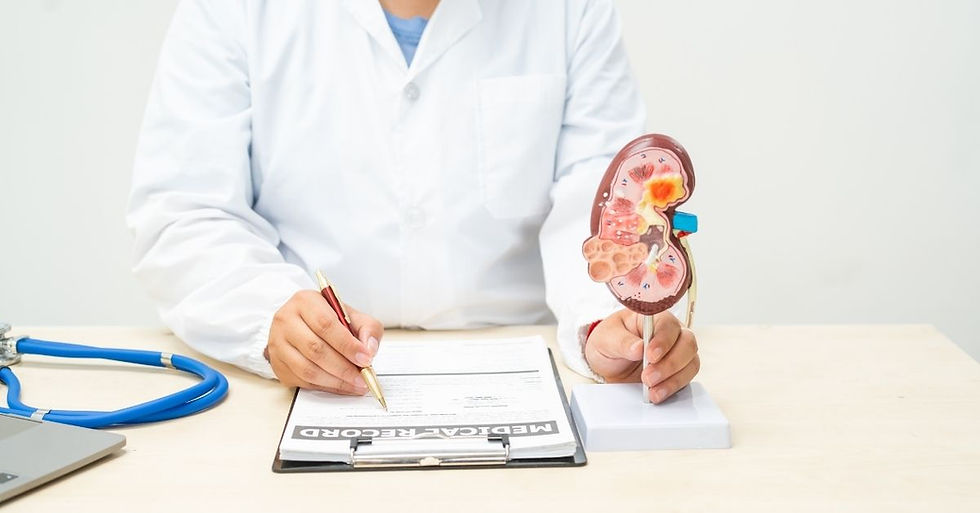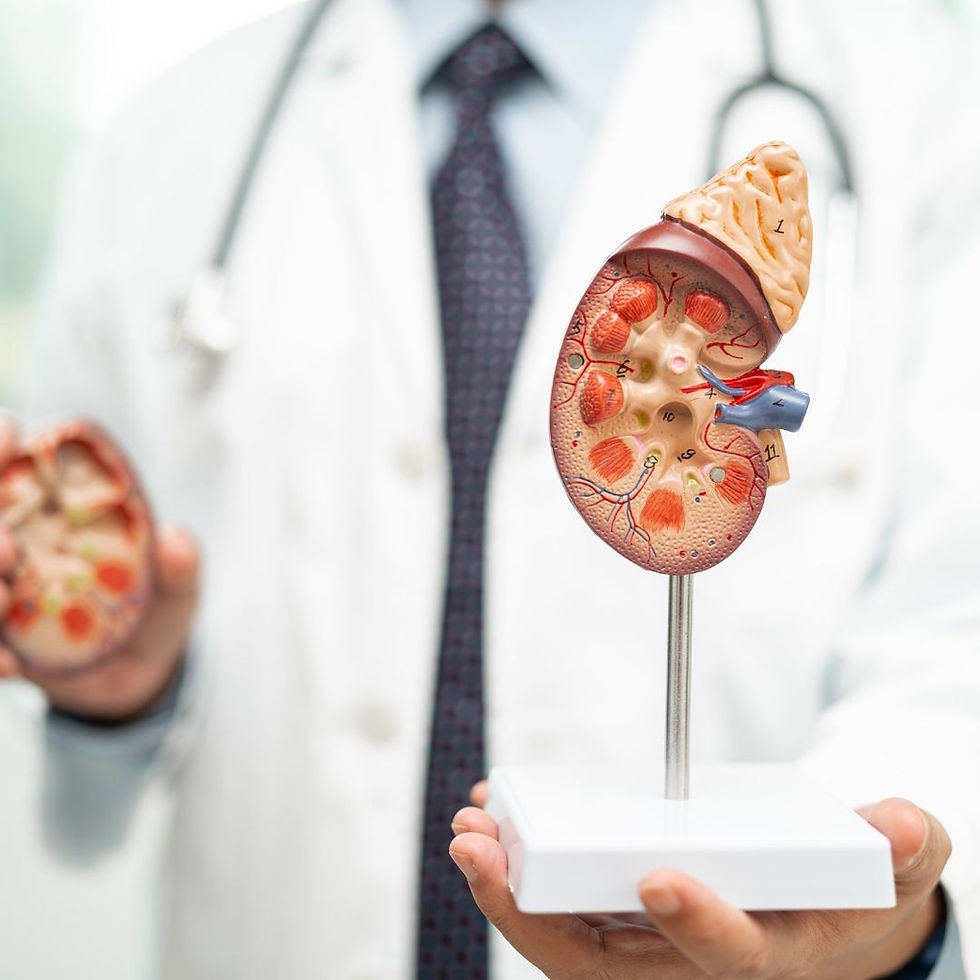Can Urgent Care Treat Kidney Stones?
- plurefy com
- Feb 28, 2025
- 12 min read

Kidney stones can be a painful and distressing condition. The sudden onset of severe pain can leave you wondering where to seek help. Is urgent care being the right way to go for kidney stone treatment?
Understanding Kidney Stones

Kidney stones are hard deposits made of minerals and salts. They form inside your kidneys and can affect any part of the urinary tract. The stones vary in size. Some are as small as a grain of sand, while others can be as large as a pebble.
Passing a kidney stone is often very painful. It's crucial to understand how they form to prevent future occurrences. Prevention is often easier than dealing with the aftermath of a painful episode.
What Are Kidney Stones?

Kidney stones develop when minerals crystallize in the urine. These tiny crystals can stick together, forming a larger stone over time. There are several types of kidney stones. The most common are calcium stones, typically made of calcium oxalate.
Less common types include uric acid, struvite, and cystine stones. Each type forms under different conditions and may require specific treatments. Recognizing kidney stones early can lead to prompt treatment and prevent complications. Understanding your type of stone helps guide effective management.
Causes and Risk Factors
Various factors contribute to kidney stone formation. When your urine contains more crystal-forming substances, the risk increases. Common risk factors include insufficient fluid intake, a diet high in sodium, and a family history of kidney stones. Your lifestyle and dietary habits play a significant role.
Some medical conditions, like obesity and certain digestive diseases, can also elevate risk. People with these conditions need to take extra precautions.
Key risk factors for kidney stones include:
Dehydration or low fluid intake.
Diets rich in protein, sodium, and sugars.
Personal or family history of kidney stones.
Medical conditions like gout and certain urinary tract infections.
Certain medications that can increase crystal formation.
Understanding these factors can help mitigate the risk and prevent recurrence. Consultation with a healthcare provider can tailor specific prevention strategies.
Symptoms of Kidney Stones

Recognizing symptoms early can lead to quicker relief and treatment. The most common symptom is severe pain, often starting in the back or side. This pain can migrate to the lower abdomen and groin.
Other symptoms include nausea, vomiting, and frequent urination. Some individuals may notice blood in their urine, known as hematuria.
In cases of small stones, symptoms might be mild or absent. However, larger stones tend to cause noticeable discomfort.
Symptoms to watch for include:
Intense pain in the back or side, often described as sharp and cramping.
Pain radiating to the lower abdomen and groin.
Nausea and vomiting.
Pink, red, or brown urine.
Persistent urge to urinate, urinating more often than usual.
Fever and chills if an infection is present.
These symptoms can overlap with other conditions, so accurate diagnosis is essential. If you're experiencing any of these symptoms, seeking medical advice can lead to effective treatment.
When to Seek Medical Attention

Knowing when to seek medical attention for kidney stones is vital. Some stones pass on their own without treatment.
However, ignoring serious symptoms can lead to complications. Evaluating the severity of your pain and symptoms can help determine the need for medical care.
If you're unsure whether to seek help, erring on the side of caution is wise. Medical professionals can provide pain relief and necessary interventions.
Here are a few scenarios when seeking medical attention becomes crucial:
Severe pain that doesn't subside with over-the-counter medication.
Blood in your urine that persists.
Accompanied nausea or vomiting that prevents keeping fluids down.
Fever and chills, indicating a possible infection.
Difficulty passing urine or changes in urine output.
Understanding these indicators can help you respond appropriately. You can avoid more severe complications with timely medical intervention.
Acting swiftly can make a difference. Timely consultation with healthcare providers can facilitate faster recovery.
Urgent Care vs. Emergency Room

Choosing between urgent care and the emergency room can be confusing. Both serve different purposes, especially when dealing with kidney stones.
Urgent care centers are ideal for non-life-threatening situations. They offer quick access to care and shorter wait times compared to ER.
The ER is necessary for severe symptoms. It can provide more comprehensive care, such as advanced imaging and surgical interventions.
Before choosing, assess the severity of your symptoms. If pain is unbearable or if you have fever, head to the ER.
In contrast, urgent care can assist with initial assessments and pain management. They can also offer basic imaging tests, like X-rays.
Here’s a guide to help you decide where to go:
Urgent Care: Mild to moderate pain, stable vital signs, no major infection signs.
Emergency Room: Severe pain, high fever, inability to pass urine, possible kidney infection.
Choosing the appropriate facility can ensure you receive suitable care. When in doubt, it's better to prioritize comprehensive evaluation.
Signs That You Need Immediate Care
Recognizing when kidney stones become an emergency is vital. Immediate medical attention can prevent severe complications.
Persistent, intense pain signifies an urgent need for evaluation. This indicates the stone may be causing an obstruction or damage.
Signs of infection, like fever and chills, also warrant immediate care. They can lead to severe kidney infections if untreated.
If you're unable to keep down fluids due to nausea, dehydration risks increase. This situation requires prompt attention to avoid complications.
Recognize these signs for immediate medical attention:
Unbearable or worsening pain.
Fever or chills alongside stone symptoms.
Inability to urinate or passing only small amounts.
Persistent vomiting preventing fluid intake.
Noticeable blood in urine or a significant color change.
Any of these signs should prompt you to seek care without delay. Quick responses can prevent further health risks and promote faster recovery.
Acting swiftly in response to these symptoms is crucial. Early intervention can lead to better health outcomes and less discomfort.
Treatment Options for Kidney Stones
Kidney stones can often be managed with various treatment options. The choice depends on the size, type, and symptoms of the stone.
Medical professionals consider many factors to determine the best course of action. These include pain level, potential for complications, and overall health.
While some stones pass naturally, others require intervention. Healthcare providers may offer medications, dietary changes, or even surgical procedures.
A variety of strategies may be employed, including:
Pain Management: To alleviate discomfort associated with kidney stones.
Diagnostic Imaging: To accurately identify the size and location of stones.
Medications: To dissolve certain types of stones or prevent future occurrences.
Non-Surgical Treatments: To facilitate the passing of stones or reduce symptoms.
Surgical Interventions: For larger or problematic stones that won't pass on their own.
Understanding the available treatments empowers you to make informed decisions. Collaborate with your healthcare provider for optimal results.
Pain Management Strategies
Pain is often the most challenging aspect of kidney stones. Effective management can significantly improve comfort and facilitate recovery.
Over-the-counter pain relievers, like ibuprofen, are commonly used. They help manage mild to moderate discomfort.
For severe pain, doctors may prescribe stronger medications. These are used under medical supervision to avoid side effects.
Additionally, strategies like heat therapy can provide relief. Applying a warm compress may soothe the affected area.
Hydration is also crucial in pain management. Adequate fluid intake can help move the stone along the urinary tract.
Combining these strategies can create a comprehensive pain management plan. Discuss options with your healthcare provider to tailor a solution to your needs.
Diagnostic Tests and Imaging

Diagnosing kidney stones accurately is essential for effective treatment. Various diagnostic tests and imaging options are available to aid this process.
Urine tests can detect blood, infection, or minerals that form stones. These tests provide crucial information about your kidney function.
Imaging tests are often employed to locate stones. Common imaging options include:
X-rays: Useful for visualizing stones, though some may not appear.
Ultrasound: A non-invasive option to detect stones and obstructions.
CT scans: Highly effective for identifying all types and sizes of stones.
Each imaging test has its strengths and limitations. Discuss with your doctor which option is most suitable for your condition.
Accurate diagnosis helps in crafting a targeted treatment plan. This ensures timely interventions and better health outcomes.
Medications and Non-Surgical Treatments
Medications play a pivotal role in managing kidney stones. They can help reduce symptoms and even dissolve some types of stones.
Doctors often prescribe alpha-blockers. These medications relax the muscles in the urinary tract, aiding stone passage.
Certain stones, like those caused by uric acid, may dissolve with specific medications. Potassium citrate is a common choice in such cases.
Other medications prevent stones from forming in the future. These include diuretics or agents that alter urine composition.
Additionally, non-surgical options like extracorporeal shock wave lithotripsy (ESWL) are available. ESWL uses sound waves to break stones into smaller, passable pieces.
These treatment options should be discussed with your healthcare provider. They'll recommend the best course based on your unique situation.
Surgical Interventions and Referrals
In some cases, surgical intervention is necessary. Large stones or those causing infections need prompt removal.
Several surgical options exist, including:
Ureteroscopy: A scope is used to remove or break the stone.
Percutaneous nephrolithotomy (PCNL): Involves a small incision to remove large stones.
Open surgery: Rarely used, reserved for the most difficult cases.
Referrals to specialists, such as urologists, might be needed. These experts can offer advanced techniques for complex cases.
Surgical interventions are typically a last resort. They are chosen when other treatments haven't worked or are unsuitable.
Discuss the potential for surgery with your doctor early on. Knowing all available options ensures you're well-prepared for every possibility.
What to Expect at Urgent Care
Visiting urgent care for kidney stones can be a daunting experience. Knowing what to expect can alleviate some of your concerns.
Urgent care centers are equipped to handle non-life-threatening conditions. They provide swift, effective care without the extended waits of emergency rooms.
The staff at urgent care centers includes trained professionals, ready to manage pain and initiate diagnostics. You’ll receive a prompt assessment to determine the severity of your symptoms.
Before arrival, it's helpful to bring essential information. This includes a list of medications, medical history, and identification.
Upon arrival, you’ll check-in and describe your symptoms. The staff will prioritize cases based on urgency.
Your visit will involve several key steps:
Assessment and Triage: To prioritize and evaluate symptoms.
Pain Management: Providing relief through medication and other methods.
Diagnostic Tests: Like urine tests or imaging, depending on availability.
Consultation: Discussing findings and recommended treatment plans.
Referral: If needed, to specialists for further management.
Each step ensures you receive appropriate care, tailored to your condition. This efficient approach distinguishes urgent care from traditional ER visits.
Initial Assessment and Triage

The initial assessment and triage process is crucial. It determines how quickly you’ll receive treatment at an urgent care facility.
Upon arrival, you'll be asked to describe your symptoms. Details about pain location, severity, and other symptoms will guide the staff.
The triage nurse will gather basic health information. This may include your vital signs, such as blood pressure and temperature.
Based on your symptoms, you'll be prioritized. Patients with severe pain or potential complications receive faster attention.
This process ensures that resources are allocated appropriately. Critical cases get the immediate care they need.
Treatment and Pain Relief at Urgent Care
Once triaged, you’ll receive treatment focused on relieving pain and discomfort. Pain relief is often a primary concern for kidney stone patients.
Urgent care facilities can administer pain medications. NSAIDs like ibuprofen are common for mild to moderate pain.
For more intense pain, stronger medications may be offered under supervision. These ensure safety while providing effective relief.
In some cases, intravenous fluids might be administered. These can help ease pain and facilitate stone movement.
Your healthcare provider will tailor the pain management approach to your needs. This personalized care helps ensure a smoother recovery process.
Referral to Specialists if Necessary
Not all kidney stone cases can be fully managed at urgent care. Sometimes, a referral to a specialist is necessary for comprehensive treatment.
If your condition requires further evaluation, urgent care providers may refer you to a urologist. Urologists specialize in urinary tract issues, including kidney stones.
Referrals might be prompted by severe symptoms, large stones, or potential complications. Specialists can offer advanced procedures like ureteroscopy if needed.
The staff at urgent care will facilitate the referral process. This includes providing necessary documents and information.
Having access to specialists ensures continuity of care. It guarantees that you receive the most appropriate and effective treatment.
Aftercare and Prevention
After addressing the immediate concerns related to kidney stones, focus shifts to aftercare and prevention. Effective aftercare is crucial for recovery and reducing recurrence.
Following initial treatment, patients should adhere to their healthcare provider's advice. This may include taking prescribed medications and making follow-up appointments.
Monitoring your condition is essential. It ensures that any remaining or new stones are detected early, preventing complications.
Preventive measures are a vital part of managing kidney stones. By addressing risk factors, patients can significantly lower the chances of future stones.
Diet and lifestyle play critical roles in prevention. Simple changes can have long-lasting benefits for kidney health.
Patients are encouraged to maintain open communication with healthcare providers. Discussing symptoms, concerns, and improvements is crucial for tailored advice.
Educating yourself about kidney stones can empower you. Understand risk factors and treatment options to make informed decisions.
Here are some key areas to focus on:
Diet modifications
Hydration strategies
Regular medical follow-ups
Lifestyle adjustments
These steps promote better kidney health and can reduce the likelihood of stone recurrence.
Follow-Up Care and Monitoring
Regular follow-up care is key to maintaining kidney health. Monitoring helps detect any changes early, allowing for timely intervention.
After the initial treatment, schedule follow-up appointments as recommended. These check-ups help assess recovery and prevent complications.
During these visits, your healthcare provider may order additional tests. These might include urine analysis or imaging studies to check for new or residual stones.
Consistent monitoring lets healthcare providers tailor advice and treatment. This personalized approach enhances recovery outcomes and overall health.
Tracking symptoms between visits is equally important. Note any changes or persistent symptoms to discuss with your doctor.
The goal is to keep your kidneys functioning optimally while minimizing future stone risk.
Lifestyle Changes and Dietary Recommendations
Lifestyle and diet have profound impacts on kidney stone prevention. Adjustments in these areas help reduce risk factors and promote overall well-being.
Dietary recommendations focus on modifying intake of certain foods. This includes limiting salt and animal protein, which are linked to stone formation.
Increasing dietary calcium is often advised. Contrary to popular belief, adequate calcium may help prevent stones by binding with oxalates.
Hydration is critical, as concentrated urine can contribute to stone formation. Aim for two to three liters of fluids per day, adjusting for activity level and climate.
Here are some tips to guide dietary changes:
Limit sodium intake.
Increase fruits and vegetables.
Monitor oxalate-rich foods.
Balance calcium consumption.
Stay hydrated consistently.
Lifestyle changes should also focus on maintaining a healthy weight. Physical activity supports overall kidney health and reduces stone risk.
For those with specific risk factors, personalized dietary plans may be needed. Consulting a nutritionist can offer valuable insights tailored to individual needs.
Importance of Hydration and Regular Check-Ups
Staying adequately hydrated is a cornerstone of kidney stone prevention. Proper fluid intake helps dilute urine and reduces the chance of stone formation.
Hydration requires consistency. It involves drinking sufficient water throughout the day, not just when thirsty.
Regular check-ups are equally important. They allow for early detection of potential problems and provide opportunities for preventive counseling.
During check-ups, discuss your hydration habits with your healthcare provider. They can offer recommendations to suit your lifestyle and climate.
Maintaining this proactive approach helps manage long-term kidney health. It minimizes the risk of new stones developing.
Staying committed to hydration and routine medical evaluations is simple yet effective. It's a powerful combination for maintaining healthy kidneys.
FAQs
Kidney stones can be a painful and concerning condition, often leading to questions about when and where to seek medical care. Understanding the role of urgent care in managing kidney stones can help patients make informed decisions.
When Should You Seek Urgent Care for Kidney Stones?
It’s important to visit an urgent care center if you experience:
Severe, persistent pain that does not improve
Nausea or vomiting
Fever or signs of infection
What Can Urgent Care Do for Kidney Stones?
Urgent care centers can provide:
Initial evaluation and pain management
Basic diagnostic tests, such as urine analysis
Imaging options like X-rays or ultrasounds for preliminary assessment
However, they may not offer complete treatment, such as surgical removal of large stones. If more advanced care is needed, they will refer patients to a specialist.
Is Urgent Care a Cost-Effective Option?

For non-life-threatening cases, urgent care is often a more affordable alternative to the emergency room, providing necessary treatment at a lower cost.
What Happens After an Urgent Care Visit?
Patients may need follow-up care with a specialist, especially if the kidney stones require additional intervention. Urgent care centers typically provide referrals for continued treatment.
Understanding the capabilities and limitations of urgent care can help you make the right choice when dealing with kidney stones, ensuring timely and effective care for a smooth recovery.
Conclusion
Navigating kidney stone concerns involves understanding when and where to seek care. Urgent care centers offer a valuable option for many stone-related issues. Choosing between urgent care and emergency rooms depends on your symptoms and needs. Awareness of symptoms helps guide timely and appropriate decision-making. Ultimately, patient education on symptoms, treatment options, and prevention plays a crucial role. This knowledge empowers people to take effective steps toward their health. Informed decisions about care lead to better outcomes. By knowing what to expect, you can confidently manage kidney stone episodes.
Summary of Key Points
Kidney stones can cause severe discomfort and require prompt management. Urgent care centers can handle many aspects, like pain relief and initial testing.
However, they may not perform complex interventions like surgeries. Emergency rooms are more suitable for severe conditions or if immediate surgical options are necessary.
Awareness of dietary and lifestyle changes is crucial for prevention. Staying hydrated and moderating certain foods can mitigate the risk of stone recurrence.
Understanding insurance implications is also important. Urgent care might be more affordable, but comprehensive treatment considerations are equally necessary.
Encouragement for Seeking Timely Treatment
Timely treatment for kidney stones can prevent complications. Even if symptoms seem mild, prompt action can ease pain and accelerate recovery.
It's always better to get care sooner rather than later. Taking steps now can ensure your well-being and peace of mind.
Source:
Mayo Clinic - www.mayoclinic.org
National Kidney Foundation - www.kidney.org
WebMD - www.webmd.com
Harvard Health - www.health.harvard.edu
Cleveland Clinic - www.clevelandclinic.org
American Urological Association - www.auanet.org










Comments